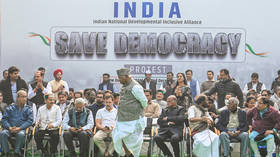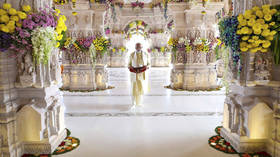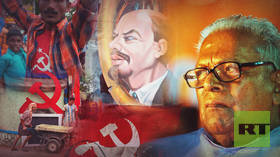India’s opposition coalition crumbles, making Modi’s return to power a foregone conclusion

Indian Prime Minister Narendra Modi is on the cusp of a historic third term in office. With general elections barely three months away (due by April-May), he has just witnessed the dismembering of his political opponents.
The opposition has been bleeding leaders in agonizingly slow motion for months, with those who still foresee a viable future for themselves switching sides to join the ruling Bharatiya Janata Party (BJP) or its adjuncts.
A near-death blow was administered to the failing opposition when the original architect of India National Developmental Inclusive Alliance (INDIA) – Nitish Kumar, the Chief Minister of the key state of Bihar, split with his opposition allies and teamed up with the BJP.
Kumar is now called “Kursi Kumar” (‘chair’ Kumar, referring to the game of musical chairs) in a nod to his lack of fidelity. Kumar is known for partnering with the dominant party in order to stay in office. However, given that he publicly swore that he would prefer to die than partner with the BJP, the fact that he so readily ditched his coalition speaks volumes.
Just before Kumar jumped into the BJP’s waiting arms came the defection of legacy politician Milind Deora, formerly a minister in the Congress-led Manmohan Singh United Progressive Alliance (UPA) government. He was also a close personal friend of Rahul Gandhi, the de facto leader of Congress, the country’s oldest political party, which is now in opposition.
As Congress politicians continue to defect, the party seems to have perfected the art of nonchalance regarding former leaders who vote with their feet and head for the exit.
The modus operandi is as follows. Whichever senior leader is the flavor of the month, the “durbar” (court) of former Congress President Rahul Gandhi – who continues to run the party behind the scenes – comes out and criticizes the newest defector. This script was followed by Jairam Ramesh, who is in charge of the Congress party’s communications. He said Deora was a deadweight whose exit was timed by Modi to derail Rahul Gandhi’s ongoing walkathon through the country, the Bharat Jodo Yatra (‘Unite India Justice March’).
If this was not incredible enough, Kumar’s somersault to the BJP also had Ramesh claiming it was “good riddance for the India bloc with opposition leaders heaving a sigh of relief.” Incredibly, before he defected, the same Congress party was batting to make Kumar the formal convenor of the INDIA alliance, and its possible face against Modi.
The Congress party is known for its nepotism: all three members of the Gandhi dynasty are active in politics: Sonia Gandhi, the longest-serving party president, and her two adult children, Rahul and Priyanka Gandhi.
Rahul Gandhi has now lost two general elections and seems poised to lose a third. The big political flex of all the Congress defectors, starting from Himanta Sarma Biswa, currently the chief minister of the northeastern state of Assam, is to blame the lackluster leadership of Gandhi before quitting. Biswa also blamed Gandhi’s pet dog, who he said got more attention in his final meeting with Gandhi before the former decided to join BJP.
Sarma was followed by current civil aviation minister Jyotiraditya Scindia, who pulled down the Congress government in the central state of Madhya Pradesh when he quit in March 2020; current Uttar Pradesh (UP) Public Works minister Jitin Prasada, in June 2021; and Ratanjit Pratap Narain Singh in January 2022 (ahead of state elections in UP).
Incidentally, Scindia, Prasada, and Singh are all from the elite Doon School that Rahul Gandhi’s father, the late Rajiv Gandhi, attended. All are heirloom politicians, born with a silver spoon (like Gandhi), and formed a close-knit group around him in the halcyon days of the UPA government. The 'RG gang', as they were dubbed, are all sons of now-departed Congress leaders close to the Gandhi family, who were made ministers by Sonia Gandhi.
The Congress defectors aren’t just young and impatient. Amarinder Singh, a septuagenarian and the former chief minister of the northern border state of Punjab, was forced out by the Gandhi siblings in September 2021 in what turned out to be a disastrous political call that led the party to lose the following state election to the newbie AAP (Aam Aadmi Party).
Kapil Sibal, a former minister and a distinguished Supreme Court lawyer who is also handling the defense in the corruption cases filed by the Modi government against the Gandhi family, left the party after going public about the throttling of inner-party democracy and the disastrous leadership of Rahul Gandhi. Another senior leader Ghulam Nabi Azad, the former CM of the border state of Jammu and Kashmir, quit saying he was insulted by Gandhi.
The Congress just lost three state elections in Madhya Pradesh, Chhattisgarh and Rajasthan to the BJP that it was widely speculated to win. Despite the fact that the Congress currently has no state governments in the north, it still has a pan-India political footprint which is why the Congress needs to be the fulcrum of opposition unity for any opposition alliance to be viable.
Because of the widely perceived leadership deficit in the Congress, wildly ambitious regional party chieftains sense a vacuum and don’t take the Congress seriously. Regional leaders such as Mamata Banerjee, the Trinamool Congress chairperson and chief minister of the West Bengal state; Arvind Kejriwal, the Aam Aadmi Party founder and chief minister of Delhi; and Y S Jagan Mohan Reddy, The Yuvajana Sramika Rythu Congress Party president and chief minister of the Southern Andhra Pradesh state: each share a common allergy to the Congress and in most cases have left the Congress to found their own parties.
Each of these parties has managed to attain power by depriving Congress of its vote share; and their party cadre is locked in fierce combat with the mother party. The opportunistic contradictions of the opposition alliance are immediately obvious to the voter: They can’t claim to be national allies but fight state elections as rivals.
Wherever the Congress is in a bi-polar contest with the BJP in the states, Modi becomes the party totem and routs the Congress.
The INDIA alliance had ambitious plans to provide one united candidate against the BJP candidate in each parliamentary seat in the general election across India. Incredibly, it has still not been able to talk about sharing seats, and opposition chief ministers like Kejriwal and Banerjee are refusing to concede a single seat to the Congress.
All of this makes the big battle of 2024 a virtual cakewalk for Modi. In the sarcastic words of one senior opposition leader: “Modi is blessed to have such an opposition.” Even as an existential crisis looms, the opposition seems to be sleepwalking to its next drubbing. Indian democracy needs a better opposition.
Where India Meets Russia – We are now on WhatsApp! Follow and share RT India in English and in Hindi
The statements, views and opinions expressed in this column are solely those of the author and do not necessarily represent those of RT.














